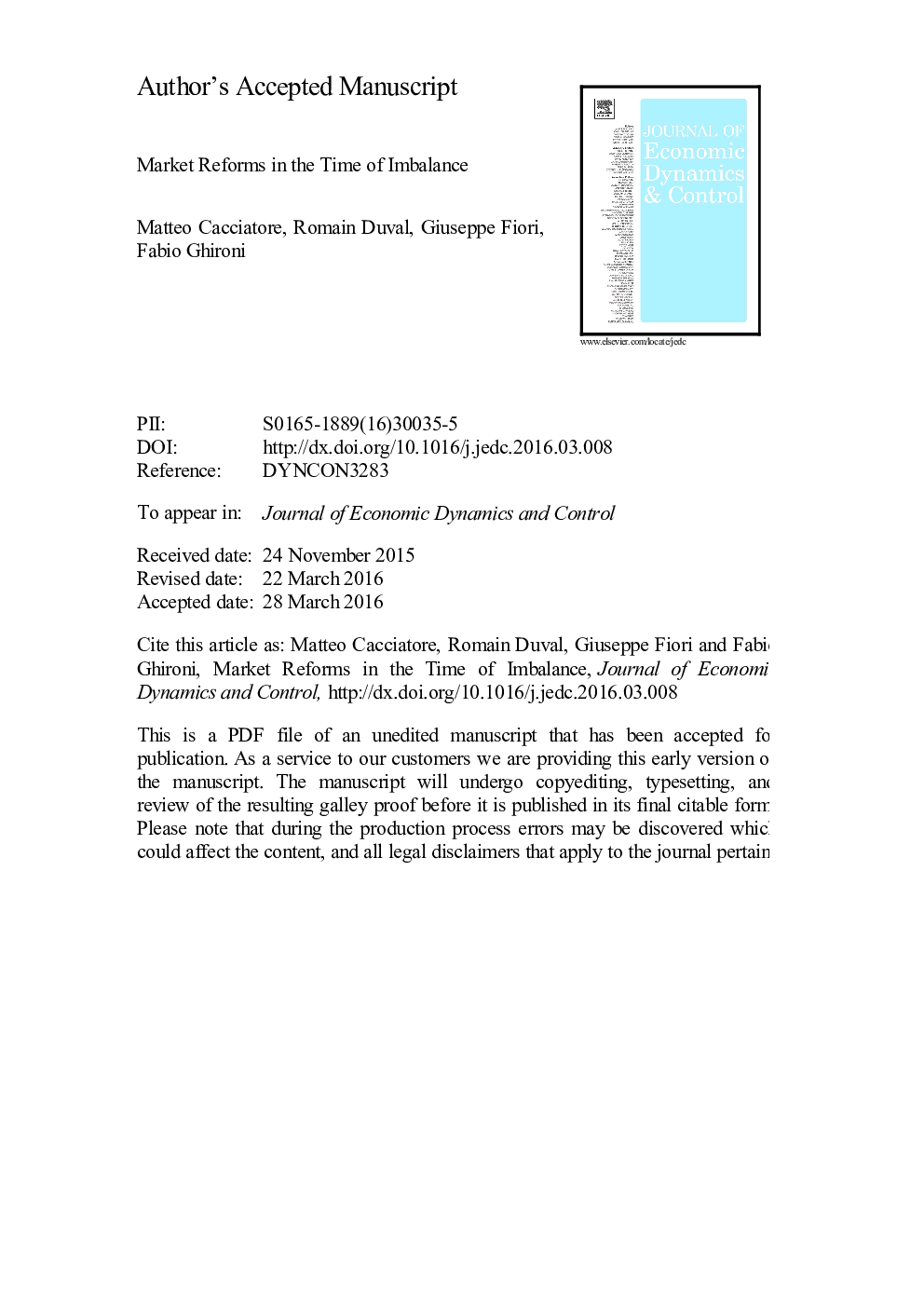| کد مقاله | کد نشریه | سال انتشار | مقاله انگلیسی | نسخه تمام متن |
|---|---|---|---|---|
| 5098125 | 1478673 | 2016 | 52 صفحه PDF | دانلود رایگان |
عنوان انگلیسی مقاله ISI
Market reforms in the time of imbalance
ترجمه فارسی عنوان
اصلاحات بازار در زمان عدم تعادل
دانلود مقاله + سفارش ترجمه
دانلود مقاله ISI انگلیسی
رایگان برای ایرانیان
کلمات کلیدی
ترجمه چکیده
ما بررسی عواقب اصلاحات در محصول و بازار کار در یک مدل دو کشور با اصطکاک ورود تولید کنندگان داخلی و بازار کار است. ما در مورد نقش شرایط چرخه تجاری و محدودیت های خارجی در زمان اجرای اصلاحات (یا تعهد معتبر به آن) در شکل دادن اثرات پویشی چنین سیاست هایی تمرکز می کنیم. اصلاح بازار کالا به عنوان کاهش هزینه های ورودی مدل سازی می شود و در بخش غیر تجاری که تولید خدماتی را به عنوان ورودی در تولید تولید می کند، صورت می گیرد. اصلاح بازار کار به عنوان کاهش هزینه های شلیک و / یا مزایای بیکاری مدل سازی می شود. ما دریافتیم که شرایط چرخه تجاری در زمان مقرراتزدایی، تغییرات قابل توجهی را تحت تاثیر قرار می دهد. کاهش هزینه های شلیک مستلزم تأثیرات کوتاه مدت و کوتاه مدت ناشی از اشتغال در تولید و اشتغال در زمان رکود است. در مقابل، کاهش مزایای بیکاری باعث افزایش اشتغال و تولید بیشتر در رکود اقتصادی نسبت به زمان های معمول می شود. تأثیر اصلاحات بازار محصول کمتر به شرایط چرخه تجاری بستگی دارد. اطلاعیه های قابل اعتماد در مورد اصلاحات در آینده باعث ایجاد تغییرات در کوتاه مدت می شود، صرف نظر از این که آیا اعلام در زمان های عادی و یا در طی رکود اقتصادی رخ می دهد. این که آیا اثر فوری انبساطی یا انقباضی در سراسر اصلاحات متفاوت است یا خیر. سرانجام فقدان دسترسی به وام های بین المللی به موجب اصلاحات می تواند هزینه های تعدیل را افزایش دهد.
موضوعات مرتبط
مهندسی و علوم پایه
ریاضیات
کنترل و بهینه سازی
چکیده انگلیسی
We study the consequences of product and labor market reforms in a two-country model with endogenous producer entry and labor market frictions. We focus on the role of business cycle conditions and external constraints at the time of reform implementation (or of a credible commitment to it) in shaping the dynamic effects of such policies. Product market reform is modeled as a reduction in entry costs and takes place in a non-traded sector that produces services used as input in manufacturing production. Labor market reform is modeled as a reduction in firing costs and/or unemployment benefits. We find that business cycle conditions at the time of deregulation significantly affect adjustment. A reduction of firing costs entails larger and more persistent adverse short-run effects on employment and output when implemented in a recession. By contrast, a reduction in unemployment benefits boosts employment and output by more in a recession compared to normal times. The impact of product market reforms is less sensitive to business cycle conditions. Credible announcements about future reforms induce sizable short-run dynamics, regardless of whether the announcement takes place in normal times or during an economic downturn. Whether the immediate effect is expansionary or contractionary varies across reforms. Finally, lack of access to international lending in the wake of reform can amplify the costs of adjustment.
ناشر
Database: Elsevier - ScienceDirect (ساینس دایرکت)
Journal: Journal of Economic Dynamics and Control - Volume 72, November 2016, Pages 69-93
Journal: Journal of Economic Dynamics and Control - Volume 72, November 2016, Pages 69-93
نویسندگان
Matteo Cacciatore, Romain Duval, Giuseppe Fiori, Fabio Ghironi,
